Rebecca Ford, our Head of Collaboration and Learning Design, is hosting a three-month pilot learning journey to explore how the Living Change Approach can strengthen individual and organisational capacities to effect change. This is the first in a two-part series: here we explain why and how we are delivering the pilot, the next piece will share insights from the group.
From climate change and extractive economic models to global health crises, continued racial injustice and structural inequality, these are some of the intractable issues the organisations, networks and partnerships within the broad RSA community are committed to tackling. These challenges are systemic: they are complex, unpredictable, and constantly changing. There are many stakeholders with different views involved, and there is no single solution or blueprint to follow. They require us to work with uncertainty, collaborate with diverse stakeholders and employ multiple disciplines and practices.
It can be easy to just think of complex challenges as things that are ‘out there’. Like many others, we at the RSA – whether team members, Fellows or partners – are involved in communities and organisations working to create change externally. But we regularly encounter complex challenges ‘in here’ too, in the work we do day-to-day to create the conditions we need to deliver impact in the wider world. These challenges vary depending on the nature of our role and unique circumstances, but we are ingredients in the systems we are trying to change: the work we do ‘in here’ and ‘out there’ is interconnected.
How then to make sense of this and create a framework for change? The RSA’s Living Change Approach underpins how we seek to deliver our purpose of uniting people and ideas to unravel and address the challenges of our time, understanding and responding to complex problems.
The RSA’s ambition
The RSA’s Living Change Approach helps us to systemically understand and entrepreneurially act to address complex challenges. The approach combines a change model that can be flexibly applied to complex problems, underpinning methods (consolidated in a playbook), which draw on a wide range of practices and disciplines, as well as mindsets that we can cultivate to work with complexity.
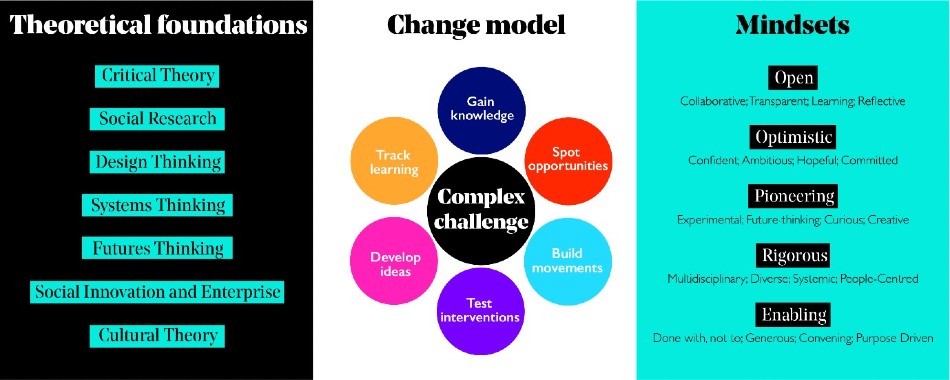 Through this three-month pilot, we are developing and testing a learning experience, which aims to enable the RSA community to increase the impact we are committed to when addressing complex social and ecological challenges. Each participant brings a personal inquiry. How can we draw together and enthuse a growing, disparate research network into a coalition that can achieve positive impact in finance? How can we make our programmes of work more participatory? How can we accelerate and embed strategic foresight into the organisation’s institutional DNA?
Through this three-month pilot, we are developing and testing a learning experience, which aims to enable the RSA community to increase the impact we are committed to when addressing complex social and ecological challenges. Each participant brings a personal inquiry. How can we draw together and enthuse a growing, disparate research network into a coalition that can achieve positive impact in finance? How can we make our programmes of work more participatory? How can we accelerate and embed strategic foresight into the organisation’s institutional DNA?
These are three of the questions some of our participants arrived with. They are different in scope to the population-level challenges ‘out there’ like climate change and structural inequality, but these challenges are nested within them and certainly require a systemic and entrepreneurial approach.
As we explored in a recent RSA journal piece, as people working to create change we need to be equipped with the mindsets, practices and tools to engage with complex challenges if we are going to maximise the potential for impact. But the dominant ways of understanding and responding to problems in the world today do not always recognise this. As the late seminal systems thinker Donella Meadows said: “The world is a complex, interconnected, finite, ecological-social-psychological-economic system. We treat it as if it were not, as if it were divisible, separable, simple, and infinite. Our persistent, intractable global problems arise directly from this mismatch.”
Finding our way through complex challenges (both ‘in here’ and ‘out there’) is not going to be possible using the mindsets which created them. Rather than separating and simplifying, we need to engage different perspectives, draw on a range of disciplines and practices, and experiment our way forwards.
This is what the Living Change Approach does. It provides a way of thinking about the bigger picture and more systemically about the issues we are trying to understand. This includes reflecting on ourselves, our communities and our organisations as ingredients in the change we are trying to create, while also spotting opportunities so we can take entrepreneurial action in the here and now, testing and learning from what works and what doesn’t along the way.
The RSA has been developing and testing the Living Change Approach over the past few years with colleagues, fellows and partners. It is continually evolving and – just as important to us – is embracing a ‘learn, adapt, evolve’ attitude as we design and test different learning pathways to build capacity in this approach across the RSA community. We recently set out on a three-month pilot of a learning journey aiming to do exactly this.
What does the journey look like?
We have brought together a group of 10 RSA Fellows, partners and team members to deepen our Living Change capabilities and apply the approach to the complex challenges in our own work. We are spending 12 weeks learning through live inquiry, with and from a peer group who bring a mix of perspectives and experiences from different parts of the RSA community.
We kicked off the journey in late January with the aim that by the end of this month we will have strengthened our own Living Change capabilities through immersing ourselves in the approach. This involves applying the principles, mindsets, frameworks and tools to our own learning questions whilst also connecting to each other’s work, building relationships and tapping into the collective potential of the group.
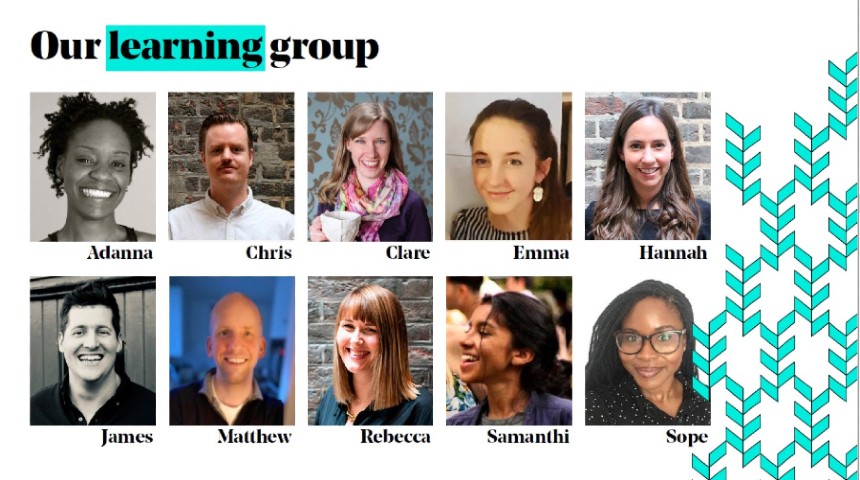 We have chosen to call this a learning journey as opposed to ‘training’ or a ‘course’ for a few reasons. Firstly, because it is about collective exploration over time and is not didactic. The process combines peer-led and self-directed learning in addition to some practitioner support, and we are committed to adapting and responding to group needs and opportunities that emerge along the way.
We have chosen to call this a learning journey as opposed to ‘training’ or a ‘course’ for a few reasons. Firstly, because it is about collective exploration over time and is not didactic. The process combines peer-led and self-directed learning in addition to some practitioner support, and we are committed to adapting and responding to group needs and opportunities that emerge along the way.
Secondly, because the Living Change Approach is not just about building skills and capabilities but also about digging into mindsets and more complex aspects of learning and development. And thirdly, because we are not just focusing on our individual organisations’ success (which tends to be the focus of incubators and accelerators) but supporting and collaborating with each other as peers through a process that is generative.
With all this in mind, we have designed the journey around some core ingredients to support us to learn with and from each other through live inquiry and action.
- Living Change focused: The structure of the journey is designed to immerse us in the Living Change Approach elements and mindsets, thinking systemically about the challenges we are bringing and then taking entrepreneurial action. Each week we focus on a different element of the change approach, coupled with a mindset.
- Self-directed: Each of us brings a learning question that frames the challenge we will explore through the journey. This is an inquiry rooted in a live area of work and a personal change ambition. It guides us, motivates us, and leads us to action. The question itself may evolve over time to reflect what we are discovering.
- Peer-led: We bring a mix of expertise, perspectives and experiences. We learn with and from each other in the group sessions, drawing on the collective wisdom of the group and deepening our change practices together.
- Co-hosted: Each participant takes responsibility for co-designing and hosting a meet-up session about one element of the change model and one mindset. Two RSA hosts (myself and Hannah Pater) are in the group to guide and support along the way, whilst also actively participating in the group and bringing our own learning questions.
- Practitioner coaching: Living Change practitioners from the RSA team work closely with each learner, coaching them on the Living Change element and mindset that is the focus of the meet-up they are hosting and supporting them to design the session.
We have worked with RSA partner Enrol Yourself on the learning experience design for the journey. Many elements of our process build on their proven ‘learning marathon’ structure and principles for peer-led learning, which Zahra Davidson and the Enrol Yourself community have developed and iterated with 130 people over the past three years. While the Living Change learning journey is not entirely peer-led, peer learning is a core ingredient. Zahra and her team have been instrumental in supporting our approach; not least facilitating fortnightly action learning sessions with co-host Hannah and myself to support our commitment to reflective learning and adaptation throughout.
Our next blog will share some of the learnings from our perspectives as hosts, along with some stories and insights from the group’s experience.
If you are interested in exploring how we could create a Living Change learning experience for you, your community or organisation, get in touch: [email protected].
Related articles
-
Young at heart
Journal
Jonathan Prosser
Becoming a nation with children at its centre in 10 courageous steps.
-
Open RSA knowledge standards
Blog
Alessandra Tombazzi Tom Kenyon
After investigating ‘knowledge commons’, we're introducing our open RSA standards and what they mean for our practice, products and processes.
-
Worlds apart
Comment
Frank Gaffikin
We are at an inflexion point as a species with an increasing need for collaborative responses to the global crises we face.
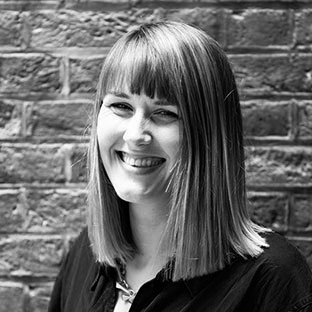
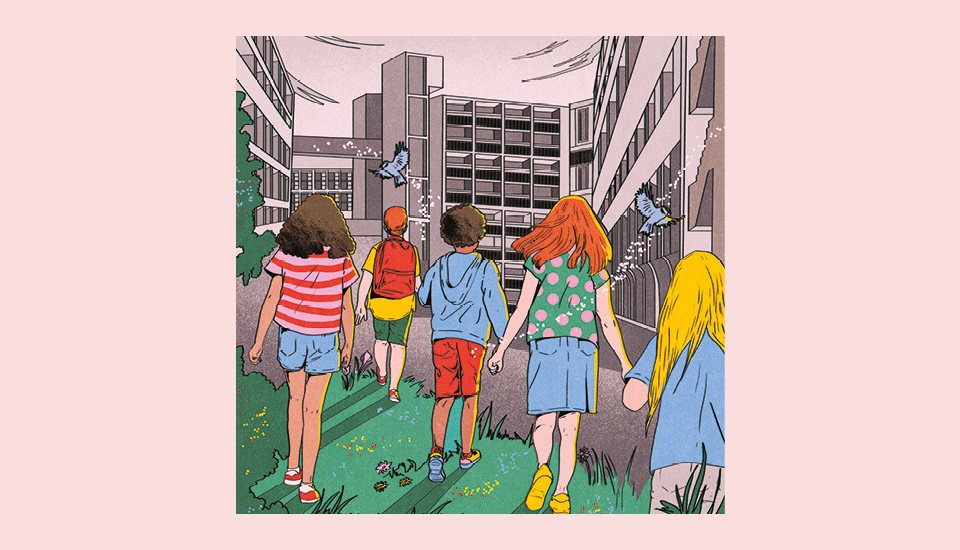

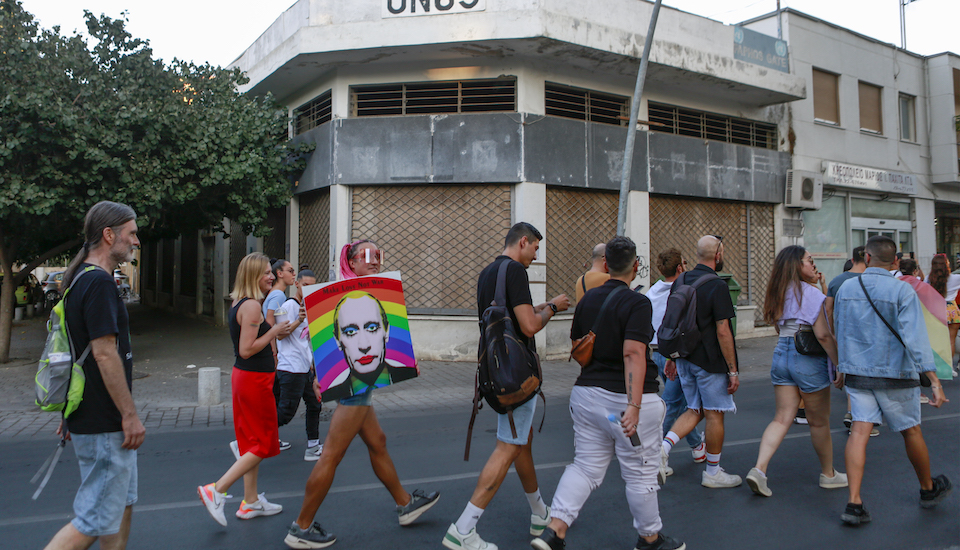
Be the first to write a comment
Comments
Please login to post a comment or reply
Don't have an account? Click here to register.